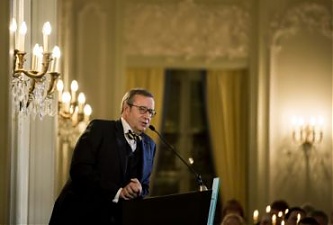Analytics, Baltic States – CIS, Estonia, EU – Baltic States, Forum, Legislation
International Internet Magazine. Baltic States news & analytics
Thursday, 25.04.2024, 15:28
Estonian president: Europe must find resolve in itself to deal with crisis
 Print version
Print version |
|---|
| Photo: president.ee |
Europe is at the crossroads for the future, in the middle of a transformational crisis. Yet Europe has overcome far greater challenges than the ones we face today, the president said according to spokespeople.
"After the Second World War in Germany alone there were 12 million internal refugees and another 12 million slave laborers, prisoners and displaced persons of 20 different nationalities, who spoke 35 different languages. In the occupation zones, 15 percent of the population of the British zone, 18 percent of the American zone and 24 percent of the Soviet zone were refugees," Ilves said.
Recalling examples of the solidarity of countries toward Europe in the immediate post-war years, the Estonian president urged European nations to gather their wits and strengths, leave behind indecision, finger-pointing and ducking of responsibility. "We will handle this migration crisis," he said.
"We must act in solidarity with those member states who bear the brunt of the crisis, we must accept some form of burden-sharing. We must have a functioning common asylum policy, especially when it comes to rejecting spurious claims and returning illegal immigrants. We need a more common approach to guarding our external borders. Is this so difficult when we look back to what Europe faced in the years after the Second World War?" he said.
"These issues – migration, burden-sharing of refugees, common approaches to Russia, to Turkey, to terror, to international law and to our own civil liberties – boil down to one question: Are we willing to defend our common values only as far as a member state's narrow interests are involved? Or whether we do more?"
These questions we will face sooner or later. If we do not find within ourselves the leadership that is the sine qua non of the creation of a unity of Europe; if we do not take a bold stand against all that violates the underpinnings of Europe, we will have to say almost three quarters of a century after Winston Churchill's speech here, that we have failed, Ilves said.
"It can be done... Europe has overcome far greater challenges than the ones we face today," he said.
"If, however, we do not rise up to these challenges, future generations will look back at us and say we failed, that we squandered our European inheritance, and ask why we did so little when so much was at stake," Ilves added.
Ilves delivered the speech at an annual symposium organized by the University of Zurich that is a commemorative event for the so-called Zurich Speech, delivered by the former British prime minister, Winston Churchill, in 1946.








 «The Baltic Course» Is Sold and Stays in Business!
«The Baltic Course» Is Sold and Stays in Business!

